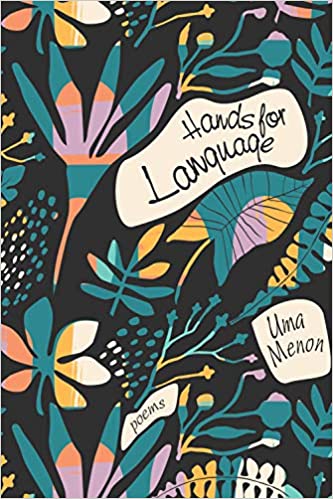I was about five years old when I realized that I wanted to become an author one day. Ten years later, at the age of fifteen, I finished writing my debut poetry book and received my first publication offer. In 2020, Hands for Language will be released from Mawenzi House Publishers. The experience of book-writing as a teen has been a dream come true, but navigating the professional literary industry has not come without its challenges. Throughout this journey, I have learned many valuable lessons that I will carry through my writing career.
Finding space in the literary sphere
I discovered poetry at a young age, indulging in rhyming couplets and quatrains as a child. It was not until later, however, that I began taking writing seriously. I took advantage of the thousands of poems that lay just a search away, immersing myself in the diverse styles and voices of contemporary literature. As a high school student, I had never received formal training in writing, and instead relied on common access resources to learn as much as I can.
 I created a Submittable account, on a whim, and sought out publications that I could submit to. Like most writers, I faced dozens of rejections at first and felt disappointment at each letter I received. But I chose to view each poem as a stepping stone into the next and found consolation in the thought that I would one day reach the other side of the river. It was not until my sophomore year of high school, dozens of poems later, that my first piece was published.
I created a Submittable account, on a whim, and sought out publications that I could submit to. Like most writers, I faced dozens of rejections at first and felt disappointment at each letter I received. But I chose to view each poem as a stepping stone into the next and found consolation in the thought that I would one day reach the other side of the river. It was not until my sophomore year of high school, dozens of poems later, that my first piece was published.
As I read more, wrote more, and submitted more, I began to receive positive feedback from editors who read my work. I received many acceptances from magazines that were impressed with my writing. Even some of those who did not publish my writing expressed that they were impressed with my age (which I included in my cover letters) and they provided feedback for improvement and words of encouragement.
While I have often heard it said that failure is an opportunity to learn, it was writing that taught me to overcome my fear of rejection and instead embrace it as an opportunity to improve my writing.
Some of the greatest experiences of my writing career occurred because of editors who saw promise in my writing. I was referred to The Adroit Journal’s Summer Mentorship Program by a magazine editor who accepted my poem. This led me to meet my first writing mentor, Eloisa Amezcua, and a wonderful community of writers through The Adroit Journal.
My first interview on writing also came about because of an editor who believed in me. These experiences were what gave me my chance while book-writing as a teen, a chance to stand out among countless professional writers submitting queries. These wonderful opportunities came about because I replied to an email or thanked an editor for their time.
Owning the process
Throughout the process of book-writing as a teen, I balanced my time between full-time school and writing. While it was often difficult to make substantial progress in writing amidst other commitments, I was able to finish the first draft of my book in just a few months. The secret? I always viewed writing as a passion, rather than as a chore. When I encountered writer’s block, I moved on rather than waiting for an idea to come, deciding to write only when I was in the headspace to enjoy it. I challenged myself to write a few poems a week, but did not create strict timelines that fostered anxiety.
Flexibility was key to my success, allowing me to define my own writing process. Whenever a poem appeared in my head, I gave myself time to write it down and create a first draft.
Sometimes, I’d pause while watching television or in the middle of homework to let my ideas flow. The time that I spent writing was time that I allotted for myself, so I made sure to maintain a healthy balance. There were many days when I was able to write three or four poems at once, but there were also some weeks where I couldn’t come up with any new pieces.
I wrote as many poems as I could, sometimes even writing multiple versions of the same piece, knowing that many would be excluded from the final book. Then, I would abandon the poems for many days—at least a week—before returning to revise and edit. That way, I could approach each poem with a “renewed” pair of eyes. Many of the poems that I wrote for this collection were also submitted to literary magazines. In an industry with few teens, I made space for myself by highlighting the uniqueness of my story.
Compiling the book
Hands for Language is what I would call a “bildungsroman in verse” in that it tells the story of my childhood growing up as a daughter of immigrants in America. At a certain point, I realized that the theme of personal identity had begun to dominate my poetry.
I decided to center a collection on this theme, hoping to empower young women of color like myself to explore and embrace their own identities. The beauty of the poetry genre, I believe, is in its flexibility and lack of solid boundaries.
My writing aims to continue pushing these boundaries and challenging creative possibility. Unlike typical poetry books, I decided to divide Hands for Language into four sections or chapters, mirroring my path to self-discovery. My book is still a narrative, just not in prose.
As my book neared completion, I began the search for a publisher, a process with which I was completely unfamiliar. Many had requirements that I couldn’t meet, whether it was age, having a previously published book, or requiring a submission fee. In the process, I realized that there are dozens of publishers out there, but only a handful of them would truly be a good fit for my work. As soon as I received an email from Mawenzi House accepting my book, I knew that it was the best fit for my book due to the publisher’s focus on multiculturalism and diversity.
Advice for book-writing as a teen
There is no doubt that success in creative writing requires dedication and time, but if words are truly your passion, every step along the way is worth it. When I began writing, I challenged myself not to write poems at a professional caliber, but to make each poem better than the previous one. I read countless pieces and identified what aspects I did and didn’t like and evaluated these aspects in my own work. Writers, especially young writers, often feel pressure to compete and be better than others as a result of limited print space, but comparing your work to that of others can be harmful and inhibits growth. Simply put, every piece is its own unique work of art and deserves individual attention, not comparison.
I began submitting my writing to publications to gain feedback on my writing and share my work with the world. I sifted through all of the opportunities listed on Submittable’s Discover feature, consulted the NewPages Young Authors Guide, and visited other websites that listed opportunities for young writers. I submitted both to teen-specific publications and other magazines. Many of my earlier works appeared in publications or issues that featured student writers. As I gathered more and more publication experience, I began submitting to literary magazines and university publications as well. I did not allow myself to be confined by my age. After I had identified a theme that I was passionate about, I began writing, until my body of work was eventually large enough to become a book.
The beauty of art lies in the infinite possibilities of what to depict and how to depict it. Throughout the history of literature, some topics have been deemed more worthy of depiction than others, but thankfully, this has begun to change in contemporary times. Delve into topics that truly matter to you and don’t feel pressure to write like others. When I first began writing, I was often afraid that my story was not important, and thus, unworthy of an audience. This thought can be difficult to overcome, but remember that each of us has a unique story to tell.
At the end of day, the verdict is this: there is no one process for writing and publishing a book. As a teenage author, the process and content of my book is unique to my age and identity. Success means something different for all of us, so it should come as no surprise that the path to success is also different for everyone. Set goals that are ambitious yet realistic, and remember to be kind and patient with yourself. Don’t be afraid to seek out help from peers and mentors, understanding that your journey book-writing as a teen might look drastically different from theirs.
Creative writing is an art that continues to evolve and diversify over time. I hope that my book, Hands for Language, creates space for young writers in the literary sphere and opens up possibilities for future generations.
If you enjoyed learning about book-writing as a teen, you may also enjoy this list of publishing opportunities for young writers.
